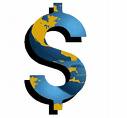Dollar Trades Near Record Low Versus Euro on Wider Yield Spread

By Kosuke Goto and Stanley White
April 23 (Bloomberg) — The dollar traded near a record low against the euro on speculation the Federal Reserve will cut borrowing costs further while the European Central Bank keeps interest rates on hold.
The greenback fell below $1.60 per euro for a second day as the extra yield that two-year German government bonds pay over similar-dated Treasuries widened to the most in two weeks and as crude oil surged above $119 a barrel. The Australian dollar reached a 24-year high against the U.S. currency after a government report showed inflation accelerated in the first quarter at the fastest pace in almost two years.
“A widening yield disadvantage is pushing down the dollar against the euro,” said Masanobu Ishikawa, general manager of foreign exchange at Tokyo Forex & Ueda Harlow Ltd., Japan’s largest currency broker. “The European economy is stronger than the U.S. Hefty oil prices are bad for consumption in the U.S.”
The dollar traded at $1.5973 per euro at 10:45 a.m. in Tokyo, from $1.5991 in New York yesterday, when it touched $1.6019, the lowest since Europe’s currency debuted in 1999. The dollar traded at 103.04 yen from 103.02 yen. The euro traded at 164.58 yen from 164.76 yen. The dollar may fall to $1.6030 a euro today, Ishikawa forecast.
Australia’s dollar rose to 95.04 U.S. cents, the highest since 1984, from 94.47 cents in New York yesterday. It also climbed 0.5 percent to 97.75 yen from 97.33 yen. Faster inflation may support the Reserve Bank of Australia’s case for keeping interest rates at a 12-year high of 7.25 percent.
Dollar Index
The Dollar Index traded on ICE futures in New York, which tracks the U.S. currency against those of six trading partners, traded at 71.383 today from 71.329 yesterday. It dropped to a record of 70.698 on March 17. The U.S. currency traded at $1.9959 against the British pound from $1.9954, and was at 1.0036 versus the Swiss franc from 1.0033.
The 15-nation European currency strengthened against the dollar yesterday as ECB governing council member Christian Noyer said policy makers will act to restrain consumer prices if inflation doesn’t slow.
Two-year German government bonds yield 1.70 percentage points more than Treasuries with similar maturities compared with 1.62 percentage points before Noyer’s comments.
“Our big problem is to make sure that inflation falls back below 2 percent next year,” the Bank of France governor said in an interview on RTL radio. “We’ll do what it takes for that.”
`Go Both Ways’
Noyer later told the Wall Street Journal that interest rate “movements can go both ways.” He said his earlier statements had been over interpreted, according to the newspaper.
Policy makers are wary inflation will quicken as oil has surged 24 percent in 2008 to a record. The euro-dollar had a correlation of 0.96 with oil over the past year, according to data compiled by Bloomberg. A reading of 1 would mean the two moved in lockstep. The U.S. is the world’s biggest oil importer.
“Between the euro and oil, there is a feedback loop, which affects the world economy,” Yasunari Ueno, chief market economist at Mizuho Securities Co. in Tokyo, wrote in a research note today. Higher oil prices “raise expectations of the ECB’s rate rise, then this leads to a stronger euro and a weaker dollar on widening rate gaps. This further leads to higher oil.”
Norway’s krone traded at 4.9566 per dollar, close to the highest since 1980, from 4.9641 yesterday before a meeting of the central bank today. The target lending rate will be increased by a quarter-percentage point to 5.5 percent, all but one of the 24 economists surveyed by Bloomberg News said.
Euro’s Advance
The euro has risen 1.2 percent in April and 9.5 percent this year against the dollar on speculation inflation will discourage the ECB from lowering its 4 percent main refinancing rate. A European Union report showed last week that annual inflation rose to a 16-year high of 3.6 percent in March.
“Euro strength has more room to run,” said Hideki Amikura, deputy general manager of foreign exchange in Tokyo at Nomura Trust and Banking Co. Ltd., a unit of Japan’s largest brokerage. “ECB policy makers’ comments show that the chance of a rate cut this year has all but disappeared.”
The euro may rise to $1.62 next month, he said.
The implied yield of the three-month Euribor future for December rose 0.12 percentage point to 4.59 percent yesterday. It has risen 0.61 percentage point this month as traders priced in the likelihood of a rate increase. The ECB has held its target lending rate steady since June.
The U.S. central bank has lowered the fed funds target by 3 percentage points since September to 2.25 percent to prevent the economy from tipping into a recession. Futures on the Chicago Board of Trade show an 82 percent chance that the Fed will cut its benchmark by a quarter-percentage point on April 30. The balance of bets is for no reduction.
The U.S. Commerce Department will report tomorrow that sales of new houses dropped to an annual pace of 580,000, a 13- year low, according to a Bloomberg survey.
— With reporting by Bo Nielsen and Ye Xie in New York. Editor: Chris Young, Nick Reynolds
To contact the reporter on this story: Kosuke Goto in Tokyo at [email protected]; Stanley White in Tokyo at swhite28@bloomberg

